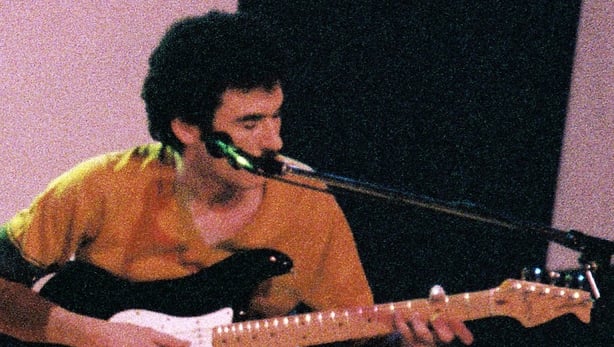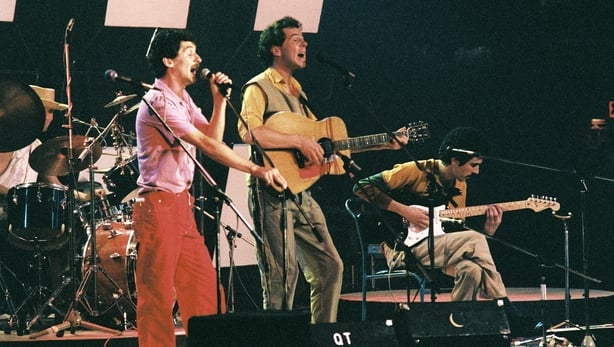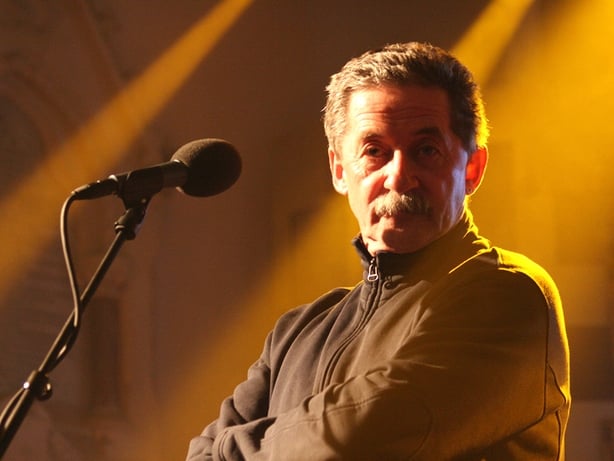The musician and film-maker Philip King toured Ireland with the late Greg Boland as a member of Scullion throughout the late 1970s and 1980s. Talking exclusively to RTÉ Entertainment, he recalls a guitarist who was held in great esteem by his peers for his musical integrity. Greg Boland's death was announced yesterday.
King, the film-maker and producer responsible for the acclaimed RTÉ2 series, Other Voices, shared a flat with Greg and Sonny Condell in Dún Laoghaire in the mid-Seventies. It was in that heady period that Scullion - "this unlikely quartet" - from diverse musical backgrounds, began to form.
The band were Greg Boland on guitars/vocals, Sonny Condell, also on guitars/vocals, Jimmy O'Brien Moran on pipes, and last but not least, Philip King on vocals and harmonica. Their first, eponymous album, released in 1979, was produced by PJ Curtis. The record employed a folk or traditional musical infrastructure, but it was avowedly eclectic and showed future leanings and tendencies.
Scullion, who became more rock-oriented as time went on, were in many people's esteem the greatest Irish band to appear in the late 1970s and to thrive thereafter in the 1980s.There are some who would argue they were the greatest Irish band ever in terms of forging a highly-original, edgily magisterial sound that bore little comparison sonically to the work of other musical acts.
Boland's guitar skills shone on everything the band did, revealing an inventive, seer-like musical vision that was fed by American jazz and blues influences in particular. The ideal album to appreciate the guitarist's contribution to the music of Scullion is the relatively stripped-down White Side of Night. On that album, his ability is perhaps more easily discerned than on his contributions to the previous record, Balance and Control. Released on the Warner label, amidst much expectation, Balance and Control was produced by the late John Martyn, with whom the band toured in Holland.
On Balance and Control, however, it might be said that Boland's guitar dynamics were part of a richer, more expansive weave, built not least on the late Jolyon Jackson's synthesisers. Yet the sparkling instrumental Back at Two, included on that collection, clearly showed the innate gift and there were other instrumentals, notably the tender Blue Side, which appeared on White Side of Night.
Boland, who was born in 1955, was the eldest boy in a talented and musically articulate family. Greg's younger brother Colin, a highly-respected sound engineer, died in 2015. Another brother, Andrew, was involved in particular with the helmsmanship of Dublin's Windmill Lane studios.

"I saw Greg's father, a doctor, play the piano at their home in Sandymount," says Philip King. "He was a talented player; Greg didn't lick it off the stones." The gutsy track Slipping Down, from the album Spin, featured an inventive contribution from Boland. Scullion's biggest hit, Carol, also displayed particular musical ingenuity from Boland and in concert, the guitarist peeled off solos and esoteric licks with what looked like consummate ease. Such impressions, however, belied the years of practice, the long hours on his own in a room that were his formation.
King sees Boland as "one of a sophisticated cadre of musicians from South Dublin who were coming from (influences such as) Chick Corea's Return to Forever, Herbie Hancock, Weather Report, George Duke. "He notes that the Average White Band's Pick Up the Pieces album was also important in terms of musical influence. The jazz-rock outfit, Naima, featuring Greg's younger brother Andrew, was the essential local product of this particular cluster of influences bearing down on the Southside.
The Scullion singer was first impressed by Greg Boland when he heard him play as a member of Supply, Demand and Curve, in an early Seventies line-up featuring Brian Masterson and the aforementioned Jolyon Jackson. King also recalls Boland's valuable contributions to Sonny Condell's first solo album, Camouflage, which was released in 1975 on the Mulligan label.

King is, however, keenly aware of the difficulties of being a musician of the calibre of Greg Boland. "When you hear all that talk about 'creative Ireland'… well, sometimes the reality tells a different tale," he says, citing David Kitt's recent announcement that he is departing Dublin as an example of such disillusionment.
Nevertheless, the musician and film-maker recognises that the late guitarist was "held in the greatest esteem by his peers for his musical integrity". "He was extraordinarily gifted and creative," remembers King. "A sonic expeditionary with a highly literate musical ability who brought a finesse and grace [to music-making]."
Since 1987, when Boland departed Scullion, Robbie Overson, an equally talented guitarist, has been the third member of the band which has remained a trio for 20 years. However, musical guests frequently join them on their performances, and indeed on their most recent album, Long Wave.
Happily, Scullion continue to tour from time to time and there are dates in Ireland in September.
Watch a recent performance in this clip here from the Sugar Club.
Watch an interview and performance of two songs on RTÉ Radio 1's Today with Sean O'Rourke earlier this summer here.
Listen to an RTÉ radio documentary from the archives on Scullion founder member Sonny Condell, including musical contributions from Greg Boland here.


